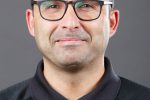
OMAHA – A team of University of Nebraska researchers hope a new grant will provide a solution for parents of children who need wearable prosthetics, but cannot afford them.

The group includes Said Abushamleh, assistant professor of electrical engineering at the University of Nebraska at Kearney. Abushamleh is a trained engineer and will work closely to design electronic components of the prostheses.
Approximately 1,500 babies are born every year with upper-limb defects, but less than 1 in 9,400 is fitted for prosthetics due to cost and device maintenance. With the help of 3D printing technology, Abushamleh and professors from University of Nebraska at Omaha, University of Nebraska Medical Center and University of Nebraska-Lincoln hope to dramatically increase access for children in need.
This clinical research effort is the first of its kind attempted in the United States.
“A parent having to travel hundreds of miles and spend tens of thousands of dollars that they do not have all so their child can have some semblance of normalcy is heartbreaking to see,” said Jorge Zuniga, Ph.D., assistant professor of biomechanics at UNO and lead investigator on the grant.
Zuniga has spent years developing 3D-printed prostheses for children, including the revolutionary “Cyborg Beast” design, which can be freely downloaded online and constructed for just $50 worth of materials. Current models cost anywhere from $4,000 to $20,000 and require expertise to maintain.
“Current versions of these prostheses do not meet the needs of growing children,” Zuniga said. “As children grow they need replacement parts, which becomes cost prohibitive for parents. Meanwhile, the children themselves want designs that match their personality, which can mean everything from closely resembling human skin tone to replicating Iron Man’s arm.”

The two-year, $150,000 grant is provided by the University of Nebraska’s Collaboration Initiative, a university-wide effort launched by President Hank Bounds in 2015 to invest in cross-campus, cross-disciplinary research in areas where NU has global leadership potential. The initiative aims to build the university’s research expertise, capacity and competitiveness for external funding. The Collaboration Initially focused on food for health; systems science was added last year to foster teamwork among faculty in the engineering and quantitative/data science fields and faculty in other disciplines.
“This is exactly the kind of project the Collaboration Initiative is intended to support,” said NU Executive Vice President and Provost Susan Fritz. “It engages faculty with expertise in a diverse range of disciplines. It puts the University of Nebraska on the forefront of an emerging area of research.
“Most importantly, this partnership will result in real solutions that will impact real people in Nebraska and beyond. I congratulate these faculty for coming together on behalf of the children and parents who will benefit from their work.”
In the first year of the grant, the team will design and produce the devices. Participants will be recruited to test the new prostheses at the start of the second year.

Joining Zuniga and Abushamleh are:
Mukul Mukherjee, Ph.D., UNO
An assistant professor of biomechanics at UNO and co-principal investigator, Mukherjee will assist the team with testing, development and analyzing participants’ brain activity as they adapt to the device.
Carl Nelson, Ph.D., UNL
A professor of mechanical and materials engineering, Nelson will assist in the construction of devices, building on his experience with robotic devices used for post-surgical rehabilitation.
Dr. Justin Cramer, M.D., UNMC
An assistant professor of radiology, Cramer’s prior research involves the use of 3D modeling and printing of medical devices, as well as patient education and training.
Ku-Chun (Joseph) Siu, Ph.D., UNMC
An associate professor of physical therapy, Siu will assist in training patients to use the device as well as setting outcome goals.
The University of Nebraska team will also consult with two clinicians: Rakesh Srivastava, CEO of Innovative Prosthetics and Orthotics, and Jean Peck, an occupational therapist from Allegiant Creighton Health.
“This is a true Nebraska collaboration that will impact the lives of hundreds here in the state and thousands across the world,” Zuniga said. “Nebraskans help each other, and that is exactly what we are doing here with our research.”
-30-
MEDIA CONTACT: Charley Reed, UNO University Communications, 402.554.2129, unonews@unomaha.edu





